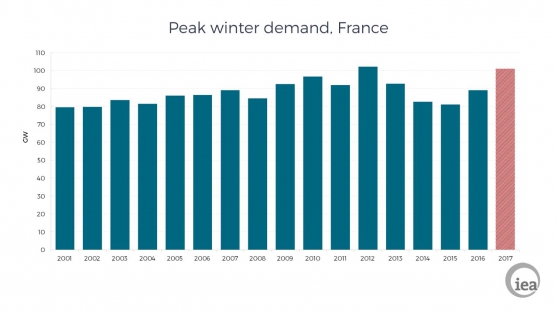France Faces Power Supply Crunch, says IEA
France finds itself experiencing peak electricity demand close to the historic peak recorded in 2012, during a particularly cold winter, the International Energy Agency (IEA) said January 24.
Because of France’s heavy reliance on electricity for winter-time heating, an additional 2.4 gigawatts of power is needed for every 1°C drop in temperature – the equivalent of two typical nuclear plants.
With 9 GW of nuclear plants shut for maintenance, out of a total of 63 GW, the country now finds itself facing an electricity supply crunch.
The IEA says electricity systems are designed with such cases in mind, but also says that 2017 has brought a particular set of challenges for France.
While France’s electricity generation is highly dependent on nuclear, which accounts for 75% of its power, renewables (mostly hydro) make up most of the remaining quarter of electricity capacity. Yet with reservoir levels at their lowest levels in ten years, hydro’s contribution to total generation is also at its lowest in a decade.
Conventional generation, which includes gas, coal and oil, makes up only about 6% of total generation, equivalent to 10% of the country’s nuclear generation in normal times – but currently believed to be more. Eurogas said January 23 that gas is stepping into the breach in terms of current winter power generation in many countries, not least Germany. In France, that has led to price spike after price spike on spot gas markets in the past 3 weeks.
Importing electricity is an option but, as the IEA notes, France has discovered that neighbours don’t have much spare power. Ones like the UK are more used to importing power from France than exporting to it. Belgium is in the process of shutting down its own nuclear power plants, a policy that the IEA cautioned last year could challenge efforts to ensure electricity security.
The IEA warns that France will need to be cautious about its move to a target of reducing electricity generation from nuclear to 50% by 2025, given possible changes in energy demand and supply. Its recently published country report on France, which can be downloaded free, says moving from 78% in 2015 to 50% in 2025 will be “challenging given the large role that nuclear electricity plays in the French mix and the average age of the fleet.”

Graphic credit: IEA
Mark Smedley
EDF said January 24 it has agreed to sign a compensation protocol with the government relating to closure of its ageing Fessenheim nuclear plant. A French law enacted August 17 2015 sets a ceiling of 63.2 GW for installed nuclear electricity generation capacity in France, which means that eventual commissioning of EDF's new Flamanville 3 nuclear complex is conditional upon the shutdown of an equivalent generation capacity.



